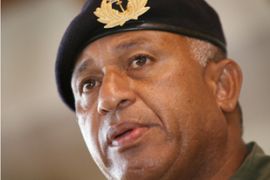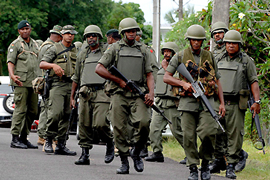Fiji deplores Commonwealth action
Military government calls suspension a price nation must pay for planned political changes.

“These [international responses] are sacrifices that have to be faced, in order to achieve what we’ve set out to do. Reforms don’t happen overnight, we’re talking about major reforms here to the political process,” Ganilau told Radio New Zealand International.
He is serving as acting prime minister while Commodore Frank Bainimarama, chief of the Fijian armed forces and self-appointed leader, is out of the country.
Aid cut-off
The Commonwealth ruled in July that unless Fiji met its demands, it would be cut off from all aid from the group and banned from the 2010 Commonwealth Games.
The group is comprised of the UK, its dependencies and many former British colonies.
Fiji has been under military rule since Bainimarama seized power in a 2006 coup.
 |
| Fiji has had a military-led government since a 2006 coup [EPA] |
His government had promised elections earlier this year, but Bainimarama reneged on the promise, saying he needed more time to eliminate corruption and reshape the country’s political system.
Bainimarama said on Tuesday that nothing will sway Fiji from its roadmap to holding elections in 2014.
“The Fiji government believes the roadmap is the only path to ensuring sustainable and true democracy, which includes … to have elections in 2014,” he told a Fiji radio station.
Netani Rika, editor-in-chief of the Fiji Times, told Al Jazeera that it is going to be “some months before the country see the effects of the [Commonwealth] suspension”.
“In the long term, the Commonwealth’s decision to cut off aid will become an issue, particulary when residents see that sources of aid to Fiji are drying up,” he said.
Strained ties
Fiji has had a strained relationship with the Commonwealth in recent years.
It had been left out of meetings since Bainimarama’s coup and often has seen its membership restricted.
The nation was first suspended in 1987 following a coup led by Lieutenant-Colonel Sitiveni Rabuka, but was readmitted a decade later after he made a formal apology to the queen.
It was again suspended when Bainimarama abrogated the constitution in 2000.
The country was readmitted the following year, but suspended from the Commonwealth’s councils when Bainimarama seized power in December 2006.